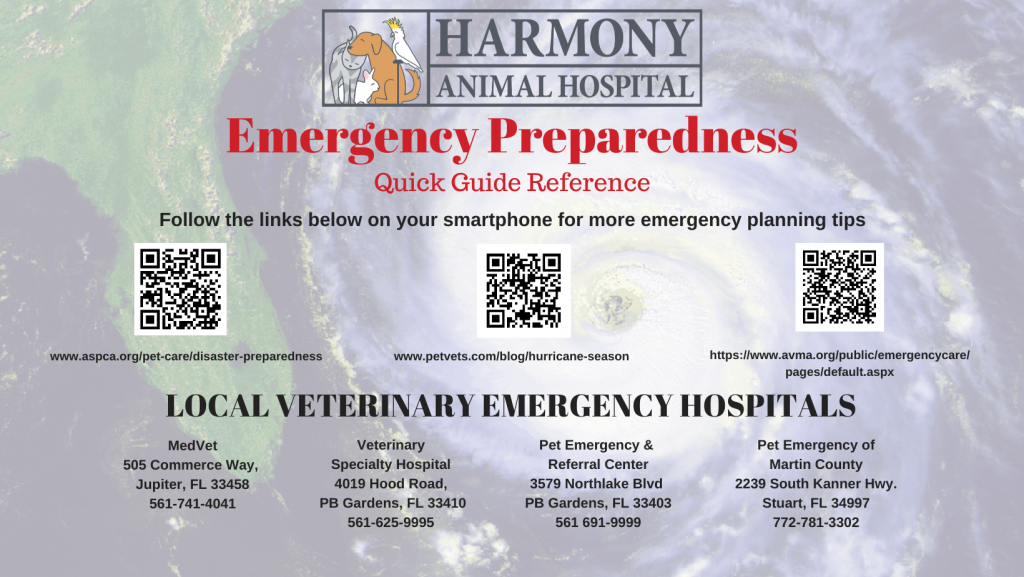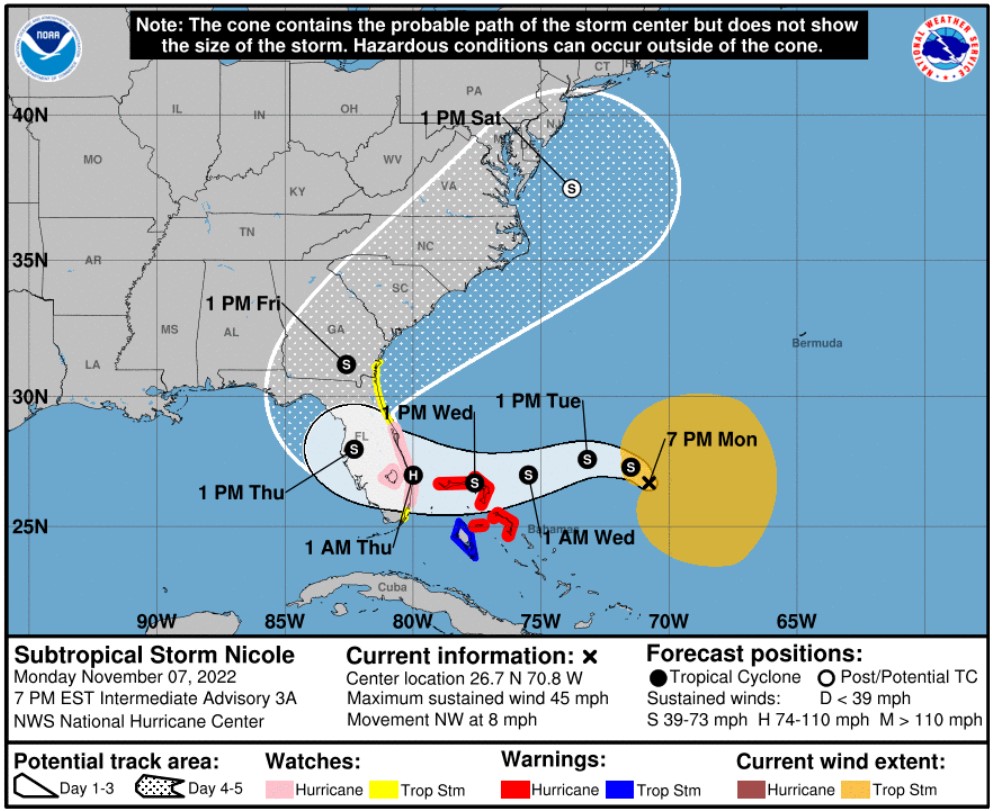Posts in Category: Seasonal
Planning for Tropical Storm/Hurricane Nicole

Just when we thought we were out of the woods for the rest of the hurricane season, Nicole decides to make an appearance at the last minute.
We don’t have as much time to prepare as last time but hopefully, you are still stocked and ready from our last scare with Hurricane Ian.
As always, we recommend being prepared in the event foul weather does come our way. It’s very important to be sure you have plenty of food, water, and medications for your animal family members.
Please contact us as soon as possible for chronic medications, storm-phobia medications, and prescription diets so that we have time to get supplies ready for your critter kids. Keep in mind, there will be many patients needing things so we must ask for your cooperation and patience as we work to help everyone get what they need. If you are ordering online, please do so right away so there is time for us to review/approve prescriptions and for the companies to ship them to you.
Additionally, we ask that you be certain that your pets’ identifications are up to date – dogs and cats should have an identification tag with a current phone number on their collars. Microchip information needs to be up-to-date with your current contact information and ideally an alternate contact in case you’re unable to be reached in an emergency. If your pet is not microchipped, we can provide this service for pets current on their rabies vaccinations. Please call to schedule a nurse appointment.
Not that we are expecting any of our community to need to be evacuated, but If you are in an evacuation zone (know your zone: https://discover.pbcgov.org/publicsafety/dem/pages/know-your-zone.aspx) our first recommendation will always be that you keep your pet(s) with you. However, this cannot always happen. If you plan on boarding at Harmony Animal Hospital this is what you need to know.
Hurricane Strength
At Harmony, we will only accept boarders if local meteorologists predict a Category 3 storm or lower. You also must live in an evacuation zone. So far, it looks like tropical storm Nicole will be knocking on our doors around Wednesday evening as a category 1 hurricane.
Keep medical records on hand
Be sure your pet is up to date on all vaccinations and has proof available. We will not accept unvaccinated animals. Call us for specific requirements.
Stock plenty of your pet’s supplies
Keep on hand those medications that your pet needs to take on a routine basis including thunderstorm anxiety medications. Please be sure you bring them in their original containers. You will also need to bring your pet’s food and enough bottled water to last your pet for at least three days (one gallon per day per pet). If the power goes out water may not be available.
Other things worth noting
You must call ahead and cannot just show up. This is usually a very stressful time and we need to stay calm and organized.
Boarders must be here within eight hours of when the hurricane is due to hit or earlier if possible. After that, all of Harmony’s employees will be home caring for their own.

Don’t Let Rover Blow Over This Hurricane Season
While other residents are buying batteries and calculating escape routes, companion animal owners are most concerned with their precious pets. One of the most common concerns at this time of year is what will happen to our companions if a hurricane strikes.
If your home is in a vulnerable area, it may become necessary to leave during the threat of a major hurricane. In this situation, the welfare of a companion animal becomes a real problem. While it may be possible and ideal to take your pet with you to the safe home of a family member or friend, some residents may not have this option.
If it becomes necessary to evacuate your home, you may need to spend some time in a Red Cross Shelter. Unfortunately, because of health reasons, Red Cross Shelters will not accept companion animals. Some people have stayed in unsafe homes with their pets rather than go to shelters without them. If it’s not safe for you to stay in your home during an emergency, it’s not safe for them either!
Plan ahead.
It is always important to plan and even make reservations if necessary. You may have to bring your companion into the Pet Hurricane Shelter eight or more hours before the hurricane. The shelter personnel will secure all of their charges and then make their own plans to be sure their homes and families are safe. Most shelters will not be able to accommodate you or your pet at the last minute so make your plans early.
Keep medical records on hand
Be sure your companion is up to date on all vaccinations and has proof available. If you are a client of ours, you can download our app where your pet’s info is available at all times. Go to our website, click on the Pet Portal tab, and Sign Up. Instructions will be sent to you from there and now you will have peace of mind that that is one less piece of paper you have to drag with you. Pet Hurricane Shelters will not accept unvaccinated animals. Dogs should be up-to-date on distemper, parvovirus, and rabies vaccines. A Bordetella vaccine (also called kennel cough) is necessary within the last 12 months. For cats, they should have had their yearly panleukopenia (also known as distemper) combo vaccine (with rhinotracheitis and calicivirus), as well as rabies. In addition, they should be up-to-date on the feline leukemia vaccine or have had a recent negative test for this disease.
Stock plenty of your companion animal’s medications
Keep on hand those medications that your companion needs to take routinely including heartworm pills. If you’re taking your pet to a shelter, it is also a good idea to bring your pet’s food and enough bottled water to last your pet for at least three days. If the power goes out, water may not be available.
Have a roomy crate available
Since the Pet Hurricane Shelters will fill up their facility over their usual capacity in order to accommodate as many companion animals as possible, it is a good idea to have a roomy crate available so the shelter can house your pet. They may have more pets needing care than there are kennels or runs available. You may also want to use this crate at home, since frightened animals may exhibit behavior changes. Familiarize your pet with the crate until he or she feels comfortable and secure in it. Place identification on the crate and your pet (see below).
Call ahead
Not all Pet Hurricane Shelters are equipped or knowledgeable enough to handle your bird and exotic animals. Call ahead to find out which shelter would be most appropriate and what requirements you might have to meet. Have an appropriate cage or enclosure for your bird or exotic companion, as most shelters (including ours) cannot guarantee the availability of enough space to house these critters. Also have plenty of your pet’s normal diet on hand, as well as enough bottled water to last at least three days.
The choice of using a Pet Hurricane Shelter should always be the last choice. There are many more companion animals than there are spaces in shelters. Use one of the shelters if no other choice is available. If you can keep your pet in a safe home, it is often advisable to have pet tranquilizers available. Contact your veterinarian well before the problem to discuss this possibility. Hurricanes are tremendously frightening to animals and they may be difficult to control and calm.
Horses and livestock
Large animals, of course, cannot be brought to Pet Hurricane Shelters. They should be boarded in barns that are strong enough to withstand the full storm surge. Sometimes it is better to leave them in a fenced pasture. Be sure your horses and other livestock are wearing identification so they can be reunited with you if they get loose and wander or become injured during the storm. Of course, secure all objects that may become deadly missiles during the storm. Horses should have a negative Coggins test, as well as their yearly vaccines (including Eastern and Western Encephalomyelitis, and tetanus). In addition, many horse veterinarians are recommending vaccinating your horse for rabies. This is a particularly good idea with a hurricane when your horse may get loose and come in contact with many displaced domestic and wild animals.
Make sure companion animals wear identification
Identification is important whether you are boarding your companion or keeping your pet at home. When the storm is over, be careful about letting your pets outside. There are many hazards to pets (and people) after a severe storm including broken glass, downed power lines, and dangerous debris. Your pet may become confused by the change to his normal environment and wander off and become lost. All pets should always wear identification in the form of a collar and tag, and a permanent identification microchip. We advise that you have your companions implanted with a microchip now, instead of waiting until a threat is imminent. Microchip implantation is a safe, and painless procedure that does not require anesthesia and only requires a few minutes. This tiny device is injected under the skin and becomes a permanent means of identifying your pet. Most animal rescue agencies can scan lost pets for microchips. If a hurricane strikes, the surroundings may appear unfamiliar to your companion and he or she may become disoriented or confused. Proper identification will increase the chances of a safe return home. Keep current photos of your pet as well. It is usually a huge undertaking after natural disasters such as hurricanes and tornadoes to reunite lost pets with their owners. In all too many cases, that never occurs and some storm orphans may be lucky enough to find a new home.
In addition, after the storm, you will need to be sure that your companion animal does not consume any contaminated food or water since garbage pickup may be non-existent for a while.
The chance of an injury occurring is a possibility. It may not be easy to get to a veterinarian after the storm has passed due to roads being blocked and phone lines down.
Take a first aid class
One of our strongest recommendations is to be ready for this possibility. Sign up for our Pet CPR/First Aid class that our doctors teach every few months. In that one evening class, you will learn how to deal with many types of emergency injuries such as bleeding, broken bones, electrocution, and suffocation. We will also teach you CPR on a realistic dog CPR mannequin. Call us for the date of the next class.
Prepare a first-aid kit
You can also be ready by having a first aid kit handy for your companion animal.
- Pet first-aid kit and guidebook (visit our store, here, at the hospital for supplies)
- 3-7 days’ worth of canned (pop-top) or dry food (be sure to rotate every two months)
- Disposable litter trays (aluminum roasting pans are perfect)
- Litter or paper toweling
- Liquid dish soap and disinfectant
- Disposable garbage bags for clean-up
- Pet feeding dishes
- Extra collar or harness as well as an extra leash
- Photocopies of medical records and a waterproof container with a two-week supply of any medicine your companion animal requires (Remember, food and medications need to be rotated out of your emergency kit—otherwise they may go bad or become useless.)
- Bottled water, at least 7 days’ worth for each person and companion animal (store in a cool, dry place and replace every two months)
- A traveling bag, crate, or sturdy carrier, ideally one for each companion animal
- Flashlight
- Blanket (for scooping up a fearful pet)
- Recent photos of your companion animals (in case you are separated and need to make “Lost” posters)
- Especially for cats: Pillowcases, toys, scoopable litter
- Especially for dogs: Extra leash, toys and chew toys, a week’s worth of cage liner.
You should also have an emergency kit for the human members of the family. Items to include: Batteries, duct tape, flashlight, radio, multi-tool, tarp, rope, permanent marker, spray paint, baby wipes, protective clothing and footwear, extra cash, rescue whistle, important phone numbers, extra medication and copies of medical and insurance information.
For any further information on how your four-legged loved ones can weather a hurricane please call your veterinarian, or the local (in Palm Beach County) Red Cross at (561) 833-7711.
Hurricane Season continues through the end of November
If you live in a flood zone plan now to have your companion animals housed safely if a hurricane strikes. Harmony Animal Hospital is one in a series of Pet Shelters. If you can’t take your companion with you to safety, (pets are not allowed in Red Cross shelters for people) bring him or her here if we are not going to be directly hit by a Category 4 or 5. If we are you will have to plan on bringing your pet with you or bring it to a friend’s house.
4th of July Safety Tips
 More pets get lost around the 4th of July than any other time of year due to fireworks noise
More pets get lost around the 4th of July than any other time of year due to fireworks noise
- Plan ahead and make sure your pet is microchipped. Between the months June and November we always have our microchips at a discounted price, so take advantage.
- Instead of bringing your pet to the festivities this year, keep them safe and happy in a sheltered & escape-proof area at home.
- Play some music or have the tv on to help mask the fireworks’ sounds.
- If your dog loves their crate, partially cover it to create a cozy cave where your pet feels hidden.
- Distract your pet with games and toys.
- There are some good supplements that you can try. We love Canna-Pet. It is a CBD oil or yummy treat made from hemp and we get very good feedback from owners. We carry their entire line and any staff member can answer any questions that you may have. If that’s not enough, then give us a call. There are short-term medications that we can use to relieve your pet’s anxiety, such as alprazolam or Sileo.
- If you notice your dog overreacting to everyday noises around your home as well, he or she isn’t alone. In fact, 2 out of 3 dogs show signs of fear to loud noises. Noise aversion is not “normal” for dogs. Overreacting to noise is a sign that your dog is fearful and anxious, similar to how you might react if you saw a monster! Don’t let your dog suffer.
Avoid vomiting/diarrhea & a trip to the vet
- Never leave alcoholic drinks unattended where a pet can reach them.
- Don’t feed/reward your pets with what you’re eating. You may pay the price all over your floor that evening.
Backyard party hazards
- Keep matches and lighter fluid out of your pet’s reach.
- Keep citronella candles, insect coils & oil products out of reach.
- Do not apply sunscreen or insect repellant that is not specifically made for pets.


